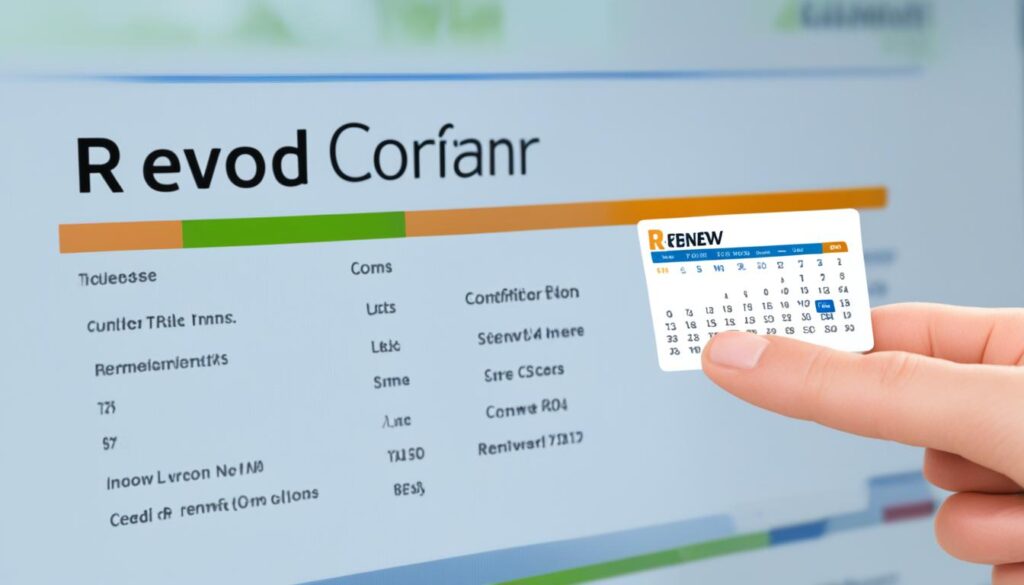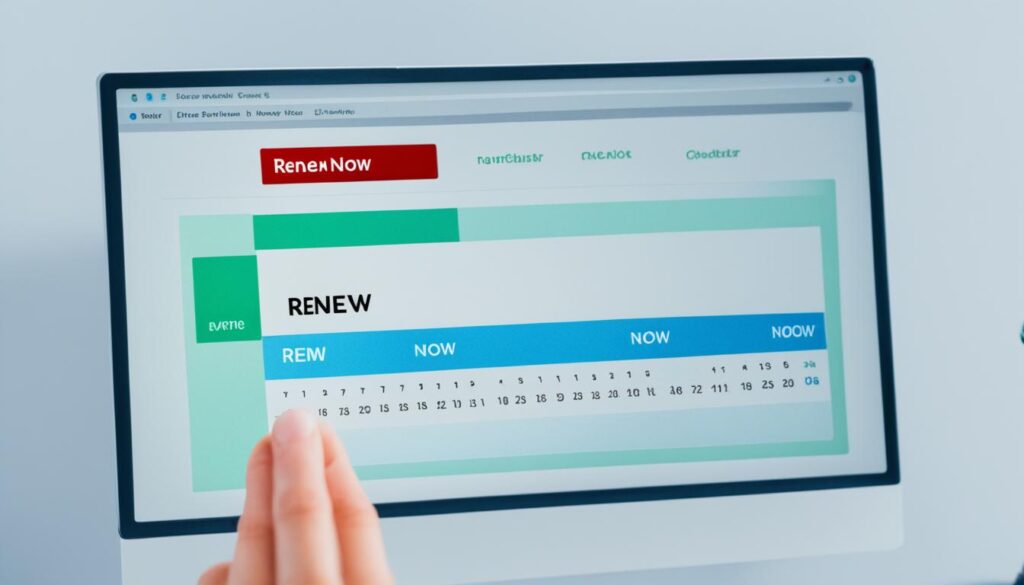Maintaining an active online presence is crucial for any business or individual in today’s digital landscape. The foundation of this presence lies in your domain name, which serves as the gateway to your website. Renewing your domain name is an essential task that ensures your website remains accessible and prevents potential disruptions to your online operations.
In this comprehensive guide, we’ll walk you through the simple steps to renew a domain name, catering specifically to Indian website owners. You’ll learn about the importance of timely domain renewal, the consequences of domain expiration, and the seamless process of renewing your domain with popular registrars such as Bluehost, Domain.com, Hostinger, SiteGround, HostGator, Namecheap, GoDaddy, and WordPress.com. Additionally, we’ll provide a bonus tip on transferring your domain to lower renewal rates.
Key Takeaways
- Renewing your domain name is crucial to maintain an active online presence and prevent disruptions to your website.
- Understand the consequences of domain expiration, including loss of website access and potential damage to your brand reputation.
- Learn the step-by-step process of renewing your domain with popular registrars like Bluehost, Domain.com, Hostinger, and more.
- Discover a bonus tip on transferring your domain to lower renewal rates and save money in the long run.
- Stay ahead of domain expiration by setting reminders and managing your domain portfolio effectively.
What is Domain Name Renewal?
Domain name renewal is the process of extending the ownership and registration period for a domain name. Maintaining an active domain name is essential for your online presence, as it allows you to keep your website, email, and other digital services running without interruption.
Unlike physical property, domain names have a limited registration period, typically lasting for one year at a time. To extend domain ownership and prevent your domain from expiring, you must renew it regularly, usually on an annual basis.
- Domain name renewal ensures that you retain control over your domain and the associated digital assets.
- The domain registration renewal process varies depending on the current status of your domain, whether it is active, expired, or in the grace period.
- Proactively managing your domain management and renewing on time can help you avoid the consequences of domain expiration, such as losing your website and email access.
Staying on top of your domain name renewal is crucial for maintaining a strong online presence and protecting your digital investments. By understanding the importance of this process, you can ensure your domain name remains active and secure for years to come.
Why is Renewing Your Domain Name Important?
Maintaining an active online presence is crucial for businesses and individuals alike. One critical aspect of this is ensuring your domain name remains valid and renewed on time. Renewing your domain name is not just a routine task – it holds significant importance for the longevity and success of your digital assets.
Avoid Domain Expiration Consequences
Failure to renew your domain name can lead to a host of problems that can severely impact your online presence. When a domain expires, it can result in website downtime, interruption of email services, and the potential loss of your brand’s online reputation. An expired domain may even become available for purchase by others, forcing you to find a new domain name and potentially lose valuable web traffic and search engine rankings.
Timely domain renewal is essential to ensure your website remains active and accessible to your audience. This protects your online reputation and preserves the digital assets you’ve worked hard to build. By renewing your domain name on time, you can avoid the consequences of domain expiration and maintain the continuity of your brand’s online presence.
“Renewing your domain name is a crucial step in safeguarding your online presence and maintaining the credibility of your brand.”
Domain availability is another important factor to consider when renewing your domain name. If you fail to renew your domain, it may become available for purchase by others, potentially leading to the loss of your established web presence and online identity. Timely domain renewal ensures that your domain remains under your control, protecting your digital assets and preserving your brand’s online reputation.
In summary, the importance of renewing your domain name cannot be overstated. It is a simple yet essential task that helps you avoid the consequences of domain expiration, maintain website uptime, and safeguard your brand’s online reputation. By prioritizing domain renewal, you can ensure the continuity and success of your digital presence.
How to Renew a Domain Name
Maintaining your online presence often starts with renewing your domain name. The domain renewal process is a crucial step in extending your domain registration and ensuring you maintain ownership of your website’s identity. Whether you’re a seasoned website owner or just starting out, understanding the steps to renew a domain name can help you stay ahead of the game and keep your digital real estate secure.
The typical domain renewal process involves a few simple steps:
- Log into your domain registrar’s account. This is the platform where you originally registered your domain name.
- Navigate to the domain management section, usually found in your account dashboard or settings.
- Locate the domain you wish to renew and select the “Renew” option.
- Choose the desired renewal duration, which can range from 1 to several years, depending on your registrar’s policies.
- Review the renewal details and make the necessary payment to complete the domain extension.
The domain renewal process is designed to be straightforward, allowing you to quickly and efficiently extend your domain registration and maintain your online presence. By staying on top of your domain renewal, you can avoid the consequences of domain expiration, such as the potential loss of your website and email addresses associated with that domain.
| Registrar | Renewal Process | Renewal Pricing |
|---|---|---|
| Bluehost | Log in > Manage Domains > Renew | $11.99 – $24.99 per year |
| Domain.com | Log in > Manage Domains > Renew | $9.99 – $19.99 per year |
| Hostinger | Log in > Domains > Renew | $8.99 – $15.99 per year |
By understanding the steps to renew a domain name and the process across various registrars, you can ensure your domain remains active and under your control, protecting your online identity and maintaining your digital presence.

How to Renew a Domain Name in Popular Registrars
Renewing your domain name is crucial to maintaining your online presence and ensuring your website remains accessible. Fortunately, the process is straightforward, whether you’re using Bluehost, Domain.com, Hostinger, SiteGround, HostGator, Namecheap, GoDaddy, or WordPress.com. Let’s explore the steps to renew your domain name with each of these popular registrars.
Renewing a Domain Name with Bluehost
To renew your domain name with Bluehost, log into your account, navigate to the “Domains” section, and click on the “Renew” button next to the domain you wish to renew. You can then select the renewal duration and make the necessary payment to complete the process.
Renewing a Domain Name with Domain.com
With Domain.com, the renewal process is similar. Log into your account, find the domain you need to renew, and click the “Renew” button. Choose the desired renewal period and proceed with the payment to secure your domain name.
Renewing a Domain Name with Hostinger
Hostinger users can renew their domain names by logging into their accounts, navigating to the “Domains” section, and locating the domain they wish to renew. Click the “Renew” button, select the renewal duration, and complete the payment to extend the registration.
Renewing a Domain Name with SiteGround
To renew a domain name with SiteGround, log into your account, go to the “Domains” section, and find the domain you need to renew. Click the “Renew” button, choose the renewal period, and proceed with the payment to secure your domain.
Renewing a Domain Name with HostGator
HostGator users can renew their domain names by logging into their accounts, navigating to the “Domains” section, and locating the domain they wish to renew. Click the “Renew” button, select the renewal duration, and complete the payment to extend the registration.
Renewing a Domain Name with Namecheap
With Namecheap, the domain renewal process is straightforward. Log into your account, find the domain you need to renew, and click the “Renew” button. Choose the desired renewal period and complete the payment to keep your domain active.
Renewing a Domain Name with GoDaddy
To renew a domain name with GoDaddy, log into your account, navigate to the “Domains” section, and locate the domain you need to renew. Click the “Renew” button, select the renewal duration, and proceed with the payment to secure your domain name.
Renewing a Domain Name with WordPress.com
If you’re using WordPress.com, the domain renewal process is integrated into your account management. Log in, go to the “Domains” section, find the domain you need to renew, and click the “Renew” button. Choose the renewal period and complete the payment to extend your domain registration.
By following these steps, you can easily renew your domain name with your preferred registrar, ensuring your online presence remains active and accessible.

Bonus Tip: Transfer a Domain Name for Lower Rates
While renewing your domain name with your current registrar may seem convenient, it’s worth exploring alternative options to potentially save money. Sometimes, the renewal cost on your existing platform can be higher than what other domain registrars offer. In such cases, transferring your domain to a different registrar that provides lower renewal rates could be a smart move.
Comparing domain renewal costs across various registrars is a wise strategy to ensure you’re getting the best deal. This bonus tip highlights the benefits of exploring alternative domain registrars to find the most cost-effective solution for renewing your domain name and maintaining your online presence.
- Investigate transfer domain name options to potentially lower your renewal rates
- Compare domain renewal costs across different registrars to find the most affordable option
- Consider domain transfer for lower renewal rates if your current registrar’s fees are higher than the competition
- Explore alternative domain registrars that may provide more competitive pricing for your domain name renewal
By taking the time to explore these options, you can ensure that you’re getting the best value for your domain name renewal, allowing you to allocate your resources more effectively towards growing your online presence and achieving your business goals.
“Transferring your domain can be a strategic move to save money on renewal costs and explore more affordable options.”
Conclusion
In conclusion, renewing your domain name is a crucial step in maintaining an active online presence and safeguarding your brand’s credibility. This comprehensive guide has provided you with the necessary information to navigate the domain renewal process effectively.
By understanding the importance of timely domain renewal and the potential consequences of domain expiration, you can now take proactive measures to ensure your domain name remains active and secure. The step-by-step instructions for renewing domains with popular registrars, such as Bluehost, Domain.com, Hostinger, SiteGround, HostGator, Namecheap, GoDaddy, and WordPress.com, offer you a seamless and efficient way to manage your domain name renewals.
Additionally, the bonus tip on transferring your domain name for lower rates can help you optimize your domain management strategy and potentially save on renewal costs. By following these guidelines, you can effectively leverage your online assets and maintain a strong digital footprint for your Indian website or brand.
